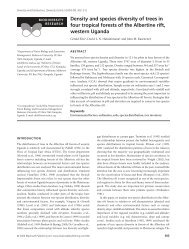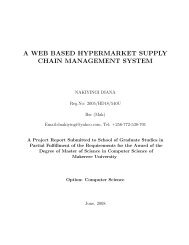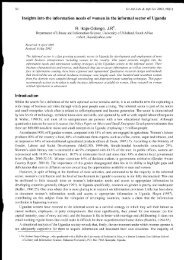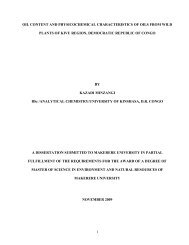THE UNIVERSITY OF LEIPZIG
THE UNIVERSITY OF LEIPZIG
THE UNIVERSITY OF LEIPZIG
You also want an ePaper? Increase the reach of your titles
YUMPU automatically turns print PDFs into web optimized ePapers that Google loves.
term automatic processing to give recognition to such routines that occur without intention<br />
and that do not give rise to conscious awareness. This arises out of distinct signals that stem<br />
from the social context which may be needed to raise the consciousness and awareness of<br />
individuals and to get them to question their experiences in processing information in<br />
situations across board. This cognitive capacity is strongly linked to intuitive capacity of the<br />
individuals to tabulate knowledge and information which they receive from both physical<br />
objects surrounding them as well as received wisdom.<br />
March and Olsen mentioned that institutions can be construed as persons that exist in<br />
different environments. They are like all other social phenomena, at the individual level,<br />
which emanates from mental constructs. 462 In this we mean that changes of such instructional<br />
constructs imply learning rehearsing and remembering. It also involves rethinking and<br />
evaluating of knowledge about an existing institution. Therefore, as individuals absorb a bowl<br />
of value-infused knowledge and beliefs, chances are that, there may be cases of ambiguity<br />
about how such beliefs come about and how such beliefs follow and in which sequence. It<br />
must also be pointed out that in a certain situation individuals also recognize that there are<br />
often cases of miss-representation of facts and issues about received wisdom on values<br />
relating to perceived knowledge. This leads to dilemmas of how to interpret both historical<br />
and current situations. 463 These dilemmas lead to knowledge ambiguity of all kinds and is<br />
frequently communicated to others.<br />
Further more, if individuals lack experience regarding the shared beliefs in a given collective<br />
environment, then they may as well act against established beliefs of others. This situation<br />
also obtains from the variation among individuals' experiences which may also lead to<br />
different interpretations of a situation. 464 Therefore, taking it from our earlier appreciation of<br />
the role of knowledge and rules in shaping society, we should point out that institutions<br />
influence how information is retrieved, organized, and selected. To say this, is not to suggest<br />
that institutions themselves think and act; but they in a way guide and determine the ways<br />
through which individuals think and act. In a way institution exert influence on individuals.<br />
However, Douglas North thinks otherwise. He insists that institutions are influenced by the<br />
knowledge they themselves have induced. 465 He seems to inform that institutions play a<br />
cyclical role in the process of knowledge generation. To take this to another level we need to<br />
understand the emergence, reproduction, and change of institutions, and the reciprocal<br />
relationship obtaining between institutions and the knowledge manifesting it’s self in the<br />
different societal environs.<br />
462 March, J. G. 1994. A Primer on Decision Making: How Decisions Happen. New York: The Free Press.<br />
463 Johnson-Laird, P.N. 2004. Mental Modelling and Reasoning. In the Nature of Reasoning, edited by J.P<br />
Leighton and J.R.Sternberg, 269-270. Cambridge: Cambridge University Press.<br />
464 Zucker, L.G. 1991. The Role of Institutionalization in Cultural Persistence. In The New Institutionalism in<br />
Organizational Analysis, edited by W.W. Powell, and P.J. DiMaggio, 83-107. Chicago:The University of<br />
Chicago Press.<br />
465 North, D. C . 1990. Opcit.<br />
96






